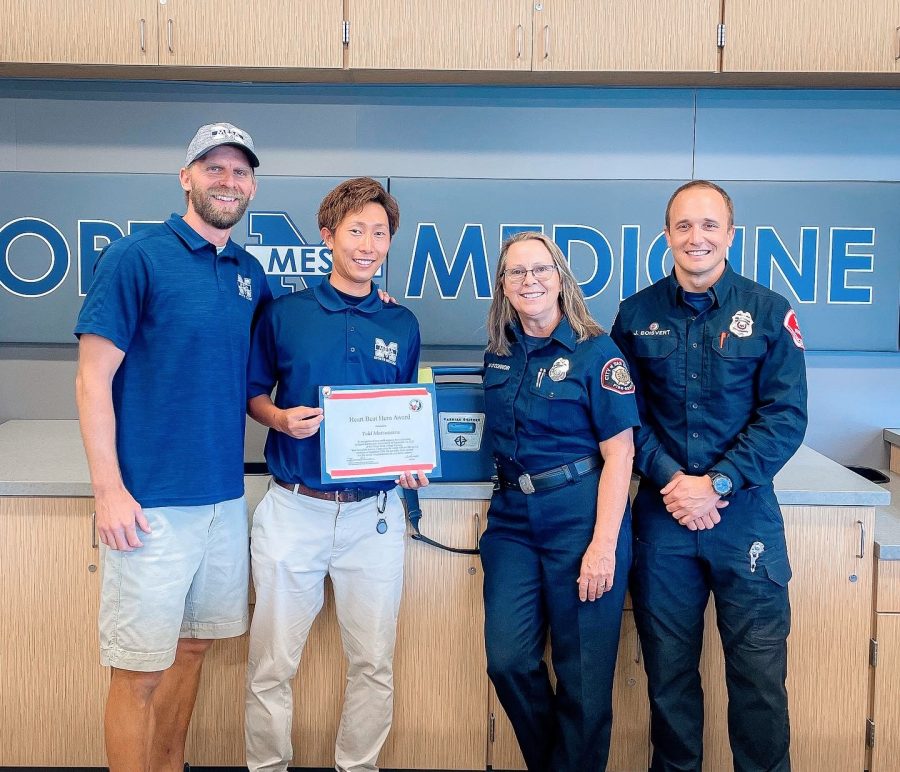San Diego Mesa College athletics trainer Yuki Matsuzawa helped save the life of a 66-year-old athlete, who suddenly collapsed during the annual Senior Games Track Meet held at Merrill Douglas Stadium on Sept. 18.
Matsuzawa was not originally scheduled to work on this day. The Mesa athletic trainers typically have Sundays off, but he volunteered to work at this on-campus event.
In an exclusive interview with The Mesa Press, Matsuzawa shared that he arrived at the track meet at 7 a.m. and began to set up for the event. A few hours later, a Mesa student-athlete ran over to his medical tent and informed him that someone had collapsed. He immediately ran over to the man and found him lying facedown. Matsuzawa did not see what had happened, so he asked spectators to explain what they saw. The spectators told him that the man was walking and unexpectedly collapsed. According to Matsuzawa, the man was breathing when he first arrived, but he was clearly extremely confused.
According to Matsuzawa, the very first thing he did was change the man’s position from facedown to face up, in order to keep the man’s neck stable. Matsuzawa explained that this is critical for administering CPR or using an AED.
“I wasn’t sure if at that point in time, CPR or an AED would be needed, but I made sure to stabilize the athlete’s neck in case it was,” Matsuzawa said.
Once the man’s neck was stabilized, Matsuzawa asked the man basic questions. The man was not responding, so he immediately made sure that 911 had been called. He was informed that Sidney Garcia and Azucena Hernandez, Mesa student-athletes, had already called.
“I pinched the man’s chest,” he said. “People usually have a natural reflex to pain, but the man did not react to the pinch. So then I quickly checked his pupils and pulse and realized that he had stopped breathing.”
With the help of another senior athlete, Matsuzawa proceeded to apply the AED and perform CPR. Once the AED began analyzing the heartbeat, he ordered everyone to step away from the athlete. The AED advised for a shock, so Matsuzawa applied one shock.
“He still wasn’t breathing 30 seconds after the shock, so I performed CPR for about another minute until he began breathing again,” Matsuzawa said. At that point, Matsuzawa said the EMS crew arrived and took over. Matsuzawa passed on any information he knew.
Matsuzawa was originally told that the patient was going to be transferred to Scripps Hospital. Later in the day, he called Scripps Hospital to check on the patient. Matsuzawa shared that the patient left Merrill Douglas Stadium conscious, but sometimes things unfortunately go wrong.
“I wanted to make sure that the man was still doing well,” he said. But when he called Scripps, they informed him that the patient was not at their hospital and they did not know what hospital he was transported to. Matsuzawa then tried to contact the patient and his wife. He did not get ahold of the patient until approximately 7 p.m. that evening.
“He has no memory of what had happened that day and didn’t remember me,” Matsuzawa said. During the call, Matsuzawa explained what had happened and the patient reassured Matsuzawa that he was stabilized and recovering at nearby Sharp Hospital.
According to Matsuzawa, the first responders on scene confirmed that the AED would not have been enough and CPR was required to save the man’s life. It was also confirmed that the man had a history of heart problems and had a heart attack in 2014, Matsuzawa said.
“I was not panicked because I am educated and confident,” Matsuzawa said. “Mesa prepared me for this incident because every four months I help teach a CPR and AED orientation to (Mesa) students,” and he said that this orientation keeps his brain fresh.
Additionally, Matsuzawa reviewed CPR and emergency history before attending the track meet. He reviewed the information because medical emergencies are more common with senior athletes. However, Matsuzawa claimed that it was slightly challenging not knowing anything about the patient. He did not even know basic information, such as the patient’s name or any medical history.
“I am very proud of the student-athletes because they are not trained or educated on this,” Matsuzawa said. “(Mesa track coach Sean) Ricketts and the student-athletes did an excellent job at following Mesa’s Emergency Action Plan and guiding the paramedics through the gates and onto the track.”
Matsuzawa met with Garcia and Hernandez on Sept. 26 because he knows that a situation like this can be very traumatic and he was worried about their mental health. He indicated that they are both doing well but were not ready to publicly speak about it.
Because of Matsuzawa’s actions, the man, who’s identity remains private, has recovered.
Mesa President Dr. Ashanti Hands praised Matsuzawa and others for coming to the man’s aid.
“Yuki, Sidney, Azucena, and Sean are shining examples of the beauty of doing the right thing, at the right time. The instinct and care they displayed speak to their humanity and is proof that as people, our presence matters. They were there with a purpose and their presence saved a life,” Hands said in a written statement. “They represent Mesa’s commitment to excellence and we are so proud and thankful for how they chose to show up, in service of others on that day.”




